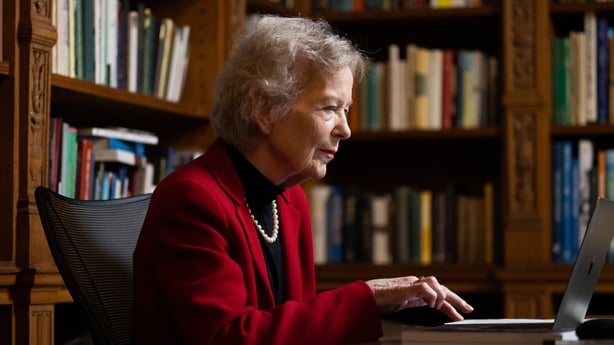"It's like confession - only worse!"
So says former President of Ireland Mary Robinson as she sits in the interviewee's chair at the start of this pacy documentary, here to recognise good works.
The latest proof of the absolutely terrifying onslaught of time is that Mrs Robinson is now 80. That means she was younger when she became President of Ireland - 46 - than a huge chunk of the paying public who will be watching and reliving the changes that the country has gone through in the last half-century.
Director Aoife Kelleher, who made the excellent Glasnevin Cemetery documentary One Million Dubliners, was spoiled for choice in terms of content, so it's a credit to her that she brings the film in at around 90 minutes with the kind of energy that epitomises her subject.
From transcending the ambition-obliterating Irish childhood that was the factory setting of the 1950s, to studying law in Trinity and Harvard, marrying a Protestant against her parents' wishes, trailblazing through a legal career, defying the odds to become our first female head of state, and then being "a voice for those who don't have a voice" as the United Nations High Commissioner for Human Rights, it is a life powered by a belief in a better future and one that is now focused on climate justice and exhorting more young women to become involved in politics.

The highlight here is, predictably, Robinson's presidential campaign as two Irelands eyeball each other: the immovable object that was the one we had all grown up in versus the soon-to-be-irresistible force of an "open, tolerant, inclusive" other. At the start of the hustings, Robinson, Labour's candidate, was at 100-1 to beat the odds-on favourite, Fianna Fáil's Brian Lenihan. Cue that great Harold Macmillan quote about events.
The chaos that engulfed Lenihan's campaign regarding phone calls made by the in-opposition Fianna Fáil to Áras an Uachtaráin in 1982 on the night that the Fine Gael government fell - seeking to avoid the dissolution of the Dáil and a general election by forming a new FF-led government - was one element of the game-changer. The other was a diatribe against Robinson by then Minister of the Environment Pádraig Flynn on RTÉ Radio 1's Saturday View. He apologised on the same day, but the die was cast.
In this film, seemingly for the sake of narrative flow, the first controversy is not covered - granted, it could be a feature-length documentary in itself - but the impact of Flynn's kamikaze interview is. You need to be at least hitting 50 to remember the statequake of that autumn. Reliving 34 years ago now feels like you're looking back 150; those too young to remember will probably think the time machine has brought them back 300. Yes, the place really was like this - and Mrs Robinson deserves to be shown in every school in the future.
Whether it's becoming president or any other achievement, Robinson deserves credit throughout this documentary for not going on a victory lap with her recollections - some do much less and wave far more. She also steps up and admits that when it comes to regrets, she has a few. One is that she left the presidency early to take up the UN job in 1997 ("It was a mistake"), another is the naivety of her visit to Dubai's Princess Latifa in 2018. In this life, everyone misses.
As for the biggest shock on screen, brace yourself: Mary Robinson says she is shy - a number of times. Indeed, in her bid to inspire the next generation to put their hands and heads up, that could be Mrs Robinson's most important message: get out of your own way and get out there.
This is a fine addition to what has already been a very good year for Irish cinema, and there will be more on offer in the next couple of months. We've come a long way - on screen and off.













